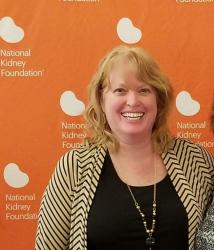Nearly 100,000 people in the U.S. need a kidney transplant,[1] but limited availability of organs for people on the wait list can result in long wait times.
For some transplant candidates, living donation can help reduce the wait. Because people can live with only one functioning kidney, they can choose to donate a kidney to someone else. For the recipient, living donor transplantation can also come with some potential health benefits, too.
In addition to the shorter wait time, living-donor recipients may find their new kidney functions immediately—while a kidney from a deceased donor may take time to regain function. And for those who receive a kidney from a family member, they may find the closer genetic match may result in a lower chance of rejection.
In February 2022, DaVita announced a change to its benefits policy that provides teammates (employees) who choose to become living donors with four weeks of paid time off for recovery from the procedure. DaVita aims to ease worries about lost wages or using accrued paid time off for the procedure—a common concern among people considering living donation.
“Now is the time to unite and support the selfless, generous individuals in our communities who take courageous action and give the gift of life," Dr. Jeff Giullian, chief medical officer for DaVita Kidney Care, said in the announcement.
In celebration of National Donate Life Month, two DaVita teammates who have gone through living donation shared their stories to talk about how they made the decision to donate a kidney and the process they went through.
A Bond Formed by The Gift of Life

Maria Nicholson has always considered herself a strong advocate for organ donation.
A DaVita teammate with more than 35 years of experience as a kidney dietitian, Nicholson’s experience with kidney patients sparked the idea of one day becoming a living donor. She saw it as an opportunity to make a difference.
While having dinner with friends from high school in May 2016, a friend mentioned her sister was back on dialysis. Nicholson’s friend had already donated her own kidney to her sister 21 years earlier, but it had recently failed.
“I immediately asked, ‘what blood type is she?’” Nicholson recalls. “I told her I wouldn’t mind being checked out as a possible donor.”
Nicholson went for evaluation and tested as a positive match. Within just a few weeks, surgery was scheduled for September 2016.
At that point, Nicholson felt it was too good to be true.
But then Nicholson had a health scare that cancelled the surgery: The transplant surgeon suspected she had colon cancer. Fortunately, a follow-up with her doctor provided a clean bill of health. Nicholson and her recipient were ready to move forward with a surgery date once again.
In November 2021, Nicholson and the recipient celebrated their five-year anniversary of successful transplant.
Over the years Nicholson and her recipient have developed a close bond and friendship. Their families remain in contact, and both Nicholson and her recipient donate time at their local kidney foundation in Ohio.
“We actually joke now about whose creatinine is better,” Nicholson says.
If Nicholson’s learned anything from this experience, it’s that no conversation is too private to share with friends or family. “You just never know where your possible donor could come from,” she says.
She hopes her story can provide inspiration to anyone considering donation so more patients are able to receive a transplant.
Today, Nicholson’s recipient works a full-time job, enjoys traveling, and spending time with friends and family. It’s been most rewarding for Nicholson to see her enjoying all aspects of life again.
“[She] feels like she’s the lucky one,” Nicholson says. “But, really, I feel like I’m the lucky one.”
Diane’s Recipe for Success
Donating a kidney to a friend or family member is an act of compassion and generosity. But when DaVita teammate Diane Finckenauer, MS, RD, CSR, chose to donate a kidney in July 2019, it wasn’t for a loved one: She chose to donate anonymously to a complete stranger.
Finckenauer has helped patients with kidney disease for much of her 30-year career, and seeing the need for organs inspired her to consider living donation as a bucket-list item.
Then she visited a local hospital’s transplant-information booth at a health care conference in 2018. The timing was right—she was healthy and ready to “share her spare.”
The transplant center matched Finckenauer with a patient whose friend was an eligible donor but medically incompatible. This friend was then matched with another recipient on the waiting list.
“I’m grateful I was able to help give a better quality of life to two people who may not have otherwise had the opportunity,” Finckenauer says. “This is the most rewarding experience of my life.”
Besides sharing her kidney, Finckenauer believes her gift lies in serving the community and helping others. In addition to working in a DaVita® center, she teaches people with chronic kidney disease (CKD) about kidney function, diet, treatment options and the transplant process as a Kidney Smart® educator. It’s no surprise that when she heard about an opportunity to provide virtual nutrition counseling to living donors in Guatemala through Bridge of Life®, Finckenauer immediately volunteered. All the donors had donated kidneys to their children, which she found especially touching.
“I was able to connect with them not just as a health care professional,” she says, “but as a fellow donor who could share and identify with their experience.”
[1] As of 3/30/2022, Organ Procurement and Transplantation Network (OPTN), U.S. Department of Health and Human Services https://optn.transplant.hrsa.gov/











